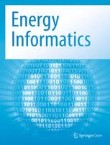Edited by Khoa Nguyen, Roman Rudel and René Schumann.
Volume 3 Supplement 1
Proceedings of the 9th DACH+ Conference on Energy Informatics
Research
Publication of this supplement was funded by the DACH+ Energy Informatics Conference Organizers, supported by the Swiss Federal Office of Energy. The articles have undergone a double blind peer review process. The Supplement Editors declare that they were not involved in the peer review process for any article on which they are an author. No other competing interests were declared.
Sierre, Switzerland29-30 October 2020
-
Citation: Energy Informatics 2020 3(Suppl 1):11
-
Comparative study of algorithms for optimized control of industrial energy supply systems
Both rising and more volatile energy prices are strong incentives for manufacturing companies to become more energy-efficient and flexible. A promising approach is the intelligent control of Industrial Energy ...
Citation: Energy Informatics 2020 3(Suppl 1):12 -
Impact of communication latency on distributed optimal power flow performance
In this work, we study the performance of a distributed optimal power flow control algorithm with respect to realistic communication quality of service. By making use of a communication network simulator, name...
Citation: Energy Informatics 2020 3(Suppl 1):13 -
Time-dependent electricity pricing using variable announcement horizons
In the battle against climate change, electrification plays an increasingly large role in our society. The growing use of electricity networks requires advanced coordination mechanisms to avoid the tragedy of ...
Citation: Energy Informatics 2020 3(Suppl 1):14 -
Comparison of approaches for intrusion detection in substations using the IEC 60870-5-104 protocol
Electrical networks of transmission system operators are mostly built up as isolated networks without access to the Internet. With the increasing popularity of smart grids, securing the communication network h...
Citation: Energy Informatics 2020 3(Suppl 1):15 -
Modeling interconnected ICT and power systems for resilience analysis
Increasing interdependencies between power and ICT systems amplify the possibility of cascading failures. Resilience against such failures is an essential property of modern and sustainable power systems and n...
Citation: Energy Informatics 2020 3(Suppl 1):17 -
State description of cyber-physical energy systems
The integration of ICT into power systems has increased the interdependencies between the two systems. The operation of power system depends on several ICT-enabled grid services which manifest the interdepende...
Citation: Energy Informatics 2020 3(Suppl 1):16 -
Trust assessment of power system states
Modern power systems are cyber-physical systems with increasing relevance and influence of information and communication technology. This influence comprises all processes, functional, and non-functional aspec...
Citation: Energy Informatics 2020 3(Suppl 1):18 -
Agent-based bidirectional charging algorithms for battery electric vehicles in renewable energy communities
This paper introduces a framework for agent based autonomous charging and discharging of Battery Electric Vehicle (BEV) at local energy communities. Agents are programmed to control the bidirectional charging ...
Citation: Energy Informatics 2020 3(Suppl 1):19 -
A socio-psychological modal choice approach to modelling mobility and energy demand for electric vehicles
The development of efficient electric vehicle (EV) charging infrastructure requires modelling of consumer demand at an appropriate level of detail. Since only limited information about real customers is availa...
Citation: Energy Informatics 2020 3(Suppl 1):20 -
Detection of heat pumps from smart meter and open data
Heat pumps embody solutions that heat or cool buildings effectively and sustainably, with zero emissions at the place of installation. As they pose significant load on the power grid, knowledge on their existe...
Citation: Energy Informatics 2020 3(Suppl 1):21 -
An operational strategy for district heating networks: application of data-driven heat load forecasts
To face the challenges of climate change, the integration of renewable energy sources in the energy-intensive heating sector is a crucial aspect of emission reduction. For an efficient operation of coupling de...
Citation: Energy Informatics 2020 3(Suppl 1):22 -
Flexibility quantification in households: a swiss case study
In this paper, a thorough analysis of quantification of the heating appliances’ flexibility provided by 200 households located in the Sion area (Switzerland) is presented. An extended evaluation of the availab...
Citation: Energy Informatics 2020 3(Suppl 1):23 -
Evaluating different machine learning techniques as surrogate for low voltage grids
The transition of the power grid requires new technologies and methodologies, which can only be developed and tested in simulations. Especially larger simulation setups with many levels of detail can become qu...
Citation: Energy Informatics 2020 3(Suppl 1):24 -
Non intrusive load monitoring for demand side management
In the context of a pilot project, the Lugaggia Innovation Community (LIC), we address the problem of non-intrusive load monitoring for the purpose of demand side management on low voltage grids in presence of...
Citation: Energy Informatics 2020 3(Suppl 1):25 -
Flexibility management and provision of balancing services with battery-electric automated guided vehicles in the Hamburg container terminal Altenwerder
Unlocking and managing flexibility is an important contribution to the integration of renewable energy and an efficient and resilient operation of the power system. In this paper, we discuss how the potential ...
Citation: Energy Informatics 2020 3(Suppl 1):26
- ISSN: 2520-8942 (electronic)
Annual Journal Metrics
-
Citation Impact 2023
Source Normalized Impact per Paper (SNIP): 0.761
SCImago Journal Rank (SJR): 0.568
Speed 2023
Submission to first editorial decision (median days): 10
Submission to acceptance (median days): 52
Usage 2023
Downloads: 394,833
Altmetric mentions: 17
